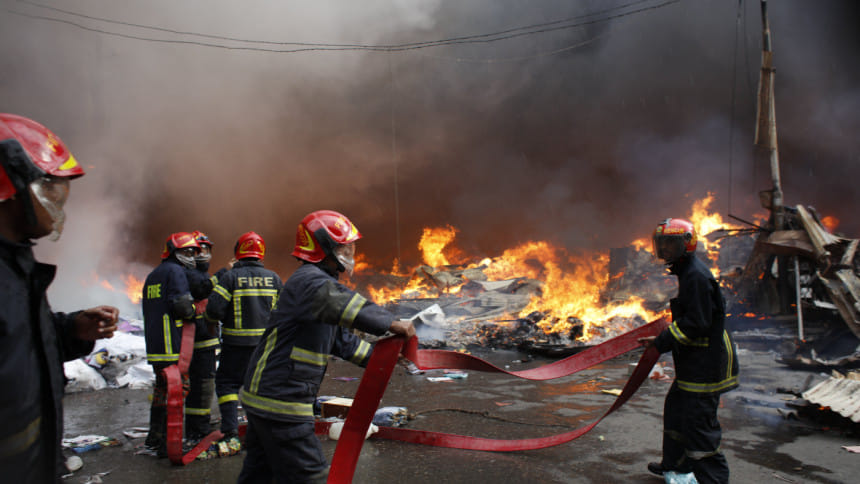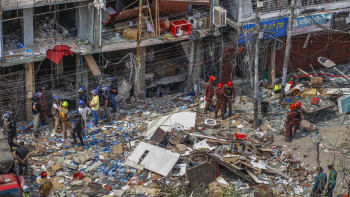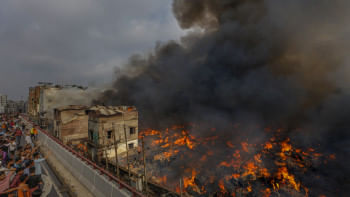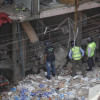The myriad gaps in our fire safety measures

At least 10 fire incidents occur in Dhaka city daily, according to Fire Service data. As such, it is not all too surprising that we regularly hear of or see fire incidents happening around us. In fact, the available data and statistics also confirm the possibility of such frequency of fires breaking out. So what are the causes behind this apparent increase in the number of fire incidents in the country?
If we take the Bangabazar fire as an example, it was four years ago that the Fire Service had declared the complex to be at risk for fires. Over the years, several fire incidents have in fact occurred at this site, too. There is no denying, by any parties, that this complex was at risk of such a fire. Now, who's to be held responsible for the oversight in not preventing the Bangabazar fire? The designated city corporation? Or the market authorities? Did these parties take any measures to prevent this risky location from catching fire? Such things must be investigated thoroughly.
We usually tend to try to hold someone or an entity responsible for such fires. In doing so, we forget to also identify the causes behind the fires. In the Bangabazar fire case, what might have been the reasons behind the complex authorities not taking the steps to prevent the fire? Was it an intentional oversight or were they simply unable to carry out these measures for one reason or another?
Another factor to consider in terms of fire incidents is awareness. Notably, the most recent fire incidents which garnered attention have taken place in both commercial and residential establishments, in older buildings and newly-constructed ones. Do these newer buildings have adequate fire safety measures in place, such as fire alarms and regular fire drills? More importantly, have our laws made enough room for fire safety to be adequately ensured? After all, fire safety awareness must have a top-down approach. If the relevant government bodies do not put pressure on individual authorities to enforce fire safety measures, no amount of awareness will be enough to prevent these tragedies.
Among the recent fire incidents, we have also seen a prevalence of explosions or blasts (such as in the Gulistan blast of March 7), which multiplies the impacts of a fire. It must be kept in mind that whenever gases or chemicals are involved, there is a very high chance of an explosion occurring. In people's homes, gas leakages and subsequent accumulation of gas can easily result in a blast and fire incident. Allowing adequate air circulation can prevent this from happening. However, this is made difficult by compact spaces in newer buildings and the fact that mercaptan (an odorous chemical added to gas to make leaks detectable) is not added to gas. Given that leakages from LPG cylinders (used in many households for cooking purposes) are undetectable and cause fires, authorities must consider adding mercaptan to the gas as a preventive measure.
As for preventing explosions at chemical storage factories or facilities, many related internationally-practised rules and regulations are not part of our laws. For one, the Globally Harmonized System (GHS) of Classification and Labelling of Chemicals is not mandatory in Bangladesh. Such failure to label every stored unit of dangerous chemical should be punishable by law.
There are too many gaps when it comes to the safe handling of chemicals in Bangladesh. In fertiliser factories, for instance, where there is an abundance of hazardous ammonia, the products stored require defined methods of handling. But process safety – which focuses on preventing fires, explosions, and chemical accidents in facilities dealing with hazardous chemicals or materials – is markedly absent from our laws. These facilities having the clearance of all regulatory authorities means very little in terms of explosion or fire prevention.
Another issue of concern is that, when an explosion does occur at a facility storing hazardous chemicals, the firefighters who respond to these incidents are never equipped with information on whether dangerous chemicals are involved or not and in what types or quantities. This makes emergency management of fires deathly dangerous for firefighters. The need of the hour is a national database of businesses which are manufacturing or importing chemicals, where these chemicals are being stored, and how they are being used.
We often see truckloads of flammable chemicals being transported through busy daytime roads. This itself represents the gap in our laws regarding the safe transportation of hazardous materials. The haphazard way in which the drivers and staff of vehicles carrying chemicals or gas cylinders handle the goods also sparks concern as to how adequately trained they are for the job.
When a business sets out to work with hazardous chemicals, there are at least 20 or so regulatory organisations which must first provide clearance to said business. However, when a massive explosion or fire incident occurs involving the business, none of these regulatory authorities accept any responsibility. Given this reality, when it comes to the safe handling and usage of hazardous chemicals, the need for a single regulatory body cannot be stressed enough.
Moreover, Bangladesh's import of chemicals has been increasing year by year thanks to the growth of the RMG and pharmaceutical industries. But how and where are these huge quantities and varieties of chemicals stored? There must be a separate authority overseeing the registration, handling, and storage of these chemicals in order to ensure safety.
Keeping in mind Bangladesh's imminent graduation out of the least developed countries (LDC) status, it would be fruitful to use whatever subsidies we are granted (while still being an LDC) to progress the sustainable management of chemicals nationwide.
Transcribed and translated by Afia Jahin.
Dr Syeda Sultana Razia is professor at the Department of Chemical Engineering in Bangladesh University of Engineering and Technology (Buet).

 For all latest news, follow The Daily Star's Google News channel.
For all latest news, follow The Daily Star's Google News channel. 











Comments